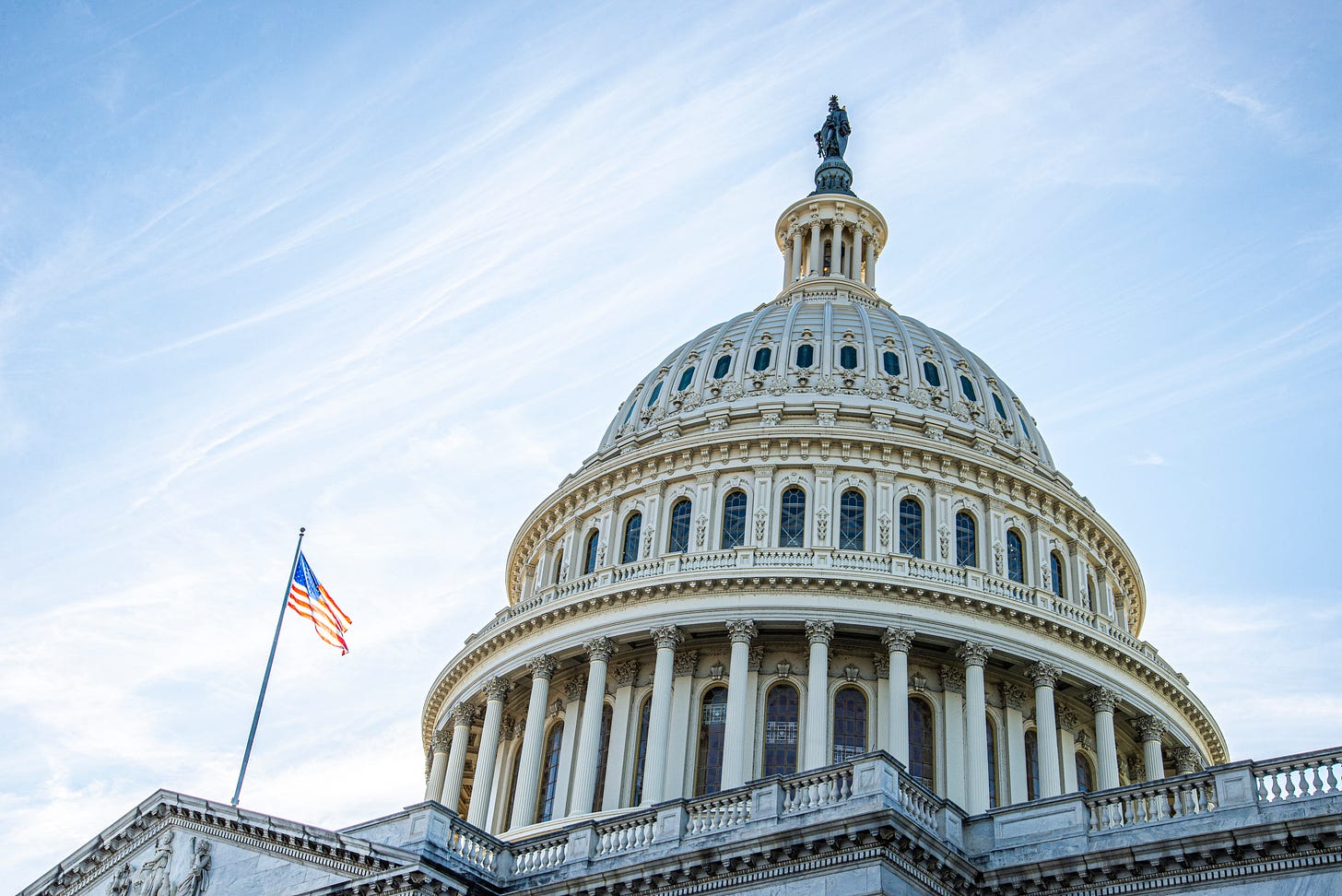Why Protecting the Congressional Budget Office Should Matter to the Congress, and to the Country
Weakening the CBO weakens Congress

This is a guest post by Philip G. Joyce. Also see the following counterviews:
Checking the Scorekeepers (Joshua Rauh et al, Liberty Lens)
Problems with CBO’s Analysis of the Coverage Impact of The One Big Beautiful Bill (Brian Blase, Paragon Health Institute)
The Trump administration’s reaction to the Congressional Budget Office (CBO) estimate of the deficit effects of their domestic policy bill, parroted by Republican supporters in Congress, is hardly surprising. There is a long history of CBO throwing cold water on the inflated claims of politicians regarding the perceived benefits of their policies. While the responses from the executive branch are fairly typical, the failure of the Congress to stand up for one of its own institutions is short-sighted and potentially damaging to both the institution of Congress and to the nation.
Attacks on CBO are particularly problematic as the need for credible budgetary and economic data has never been higher. This is, however, not the only example of where members of Congress have either amplified the attacks on Congressional institutions or prerogatives or sat idly by while others attack them. The silence of Congressional Republicans in the face of the extraordinary impoundment and other executive actions by the Trump administration threatens to weaken the Congress, perhaps permanently. The removal of the librarian of Congress and failure to defend the Government Accountability Office from threats posed by OMB and DOGE represent other examples. While Congressional myopia is not a new phenomenon, the scope of that myopia and the potential lasting damage that it could cause make this a particularly precarious moment for both truth and for the separation of powers.
In researching what is to date the only book on the history of CBO (The Congressional Budget Office: Honest Numbers, Power and Policymaking: Georgetown University Press, 2011), I identified numerous examples of CBO being attacked by administrations, both Republican and Democratic. What almost all of these have in common is that CBO analyses called into question the advertised benefits of these Presidential proposals. These disputes are precisely what put CBO on the map, starting with its first Director, Alice Rivlin, questioning the Carter administration’s inflated claims of savings that would result from its energy policies.
Things really came to a head, however, when Rivlin’s CBO challenged the Reagan administration’s supply-side claims. Reagan had argued that lower taxes wouldn’t increase budget deficits. When CBO disagreed, Reagan decried the analysis as “phony numbers”. Reagan administration officials even asked the Senate Republican leadership to have Rivlin removed and replaced by someone who was more sympathetic to the Reagan economic dogma. Senate Majority Leader Bob Dole and Senate Budget Committee Chair Pete Domenici rebuffed these efforts, noting that the Congress, and not the Reagan administration, would decide whether Rivlin was doing a good job.
While this perhaps best mirrors the current debate, because it involves a dispute over tax policy and economic growth estimates, it is hardly the only example. Bill Clinton clashed with CBO over its estimates of the effects of economic stimulus spending and about whether the Clinton health plan would add to the deficit. As a part of that effort, the administration put tremendous pressure, through Democrats in Congress (who held the majority), on then-CBO Director Robert Reischauer to change CBO’s analysis of the plan. He did not, somewhat to the surprise of many Congressional Republicans. Republicans thought that Reischauer, a Democrat, would succumb to this pressure. He held his ground largely because he was as committed as Rivlin was to CBO’s mission of calling things as they saw them.
There are many other examples where CBO has found itself in the crosshairs of criticism, often from the executive branch, but frequently from members of Congress as well. What these criticisms have in common, generally, is that proponents have an incentive to exaggerate the positive effects of their policies and downplay the negative ones. Indeed, that is why the Congress thought that it needed, in 1974, to create CBO. It wanted to understand the real economic and budgetary effects of policies that it was considering. That should be no less true today. People who care about controlling the debt should care that the numbers that underly debt control policies are based on reality, not fantasy.
Is CBO always right? Of course not. It is particularly difficult for them to forecast with any accuracy break points in the economy, such as the timing of recessions. This led, for example, to CBO errantly projecting years of budget surpluses in 2001, contributing to an environment that paved the way for the Bush tax cuts enacted during that year. Their estimates of the effects of the Inflation Reduction Act have also drawn suspicion, with a Cato Institute analysis suggesting that the costs would be much higher than initially estimated (It should be noted that most of the increased estimate results from the revenue effects, and those estimates are done by the Joint Committee on Taxation but incorporated into the CBO cost estimate). CBO itself acknowledged that the costs of the energy subsidies would be much higher than originally projected, in part because the updated estimates focus on a different 10-year window, and in part because various rule changes increased the uptake of some of these subsidies. The difficulty in making budget projections has led many to call for increased transparency from CBO, and the agency now provides much more information on the basis for its analyses than was true at times in the past. It draws on the consensus views of academic and private sector experts for its estimates and analyses.
The fact that there are inevitable errors does not change the fact that their work is done with a goal of producing the most objective, neutral analysis possible. To that end, it matters that CBO’s work is not biased toward a political policy outcome. CBO’s culture of objectivity has been established and reinforced over its 50 years of existence.
And CBO Directors—all of them—have always known that when their analyses throw cold water on particular proposals, the people who support those proposals will fire back. It is the fact that CBO has built up credibility over its half century that makes those individuals feel that they must come up with reasons why CBO numbers should not be trusted.
There are two aspects of the current attacks on CBO, however, that are relatively unusual and highly unfortunate. The first is the suggestion that CBO staff are politically biased, with the evidence provided being that some CBO staff, over the past 25 years, donated to Democratic candidates or left-leaning organizations. The significance of this claim was thoroughly debunked by the Washington Post fact-checker. Moreover, there are substantial formal and informal checks aimed at preventing political bias from influencing CBO analyses. In fact, the statute that set up CBO explicitly states that CBO staff are to be hired “without regard to political affiliation,” and the culture established by Alice Rivlin consistently reinforces its nonpartisan ethic. And it is important to note the difference between being nonpartisan and “bipartisan”; the former means that you are not allowing political considerations to influence your work, while the latter involves seeking cooperation between two political parties. It is an insult to these hard-working, committed professionals to suggest that they are somehow trying to make policies of a particular party, or a particular President, harder to achieve because of some political bias.
The second is that increasingly many of these criticisms of CBO are coming not from the executive branch, but from inside of the Congress. These include both factual misrepresentations (such as the claim that CBO understated the revenue effects of the 2017 Trump tax cuts, when the difference was entirely related to COVID-era inflation that was unanticipated by everyone) and attacks on the legitimacy of CBO itself. Of particular concern is the general lack of support shown by the Budget Committees, who have in the past generally risen to the defense of CBO in the face of executive branch criticisms. What makes the lack of Congressional support so unfortunate is the potential effect that it could have on the budgetary separation of powers. Weakening the CBO weakens Congress. Even a partisan Republican should understand that the aspects of CBO analysis that constrain a Republican President also limit overreach by a Democratic president. When the political winds change, they will need the CBO’s credibility to allow the Congress to effectively challenge future policies.
If Congress wishes to remain strong as an institution, and to continue to be able to play its constitutional role of being able to challenge the executive branch when it disagrees with its policy proposals, it needs the capacity for analysis, and the credibility, that CBO has earned over the years. Blithely attempting to toss that away in the interest of short-term policy gains is both ill-advised for the Congress and dangerous to democracy.
Philip G. Joyce is a professor of public policy at the University of Maryland School of Public Policy.
Advancing Big Ideas: Guest Posts at the Debt Dispatch
One of the things we value most at the Debt Dispatch is thoughtful debate on important fiscal issues. To deepen our exploration of big ideas, we’ve started featuring guest posts on provocative topics—especially where researchers disagree. Our goal is to surface different perspectives, invite critical thinking, and push the convers…




Great article. Please pass this along to Prof. Joyce. I was very aware of the CBO vs Politicians issue as I wrote the Substack article I posted today.
See https://tommast.substack.com/p/federal-debt-risks?r=b29s7
Tom Mast Congress is Vital